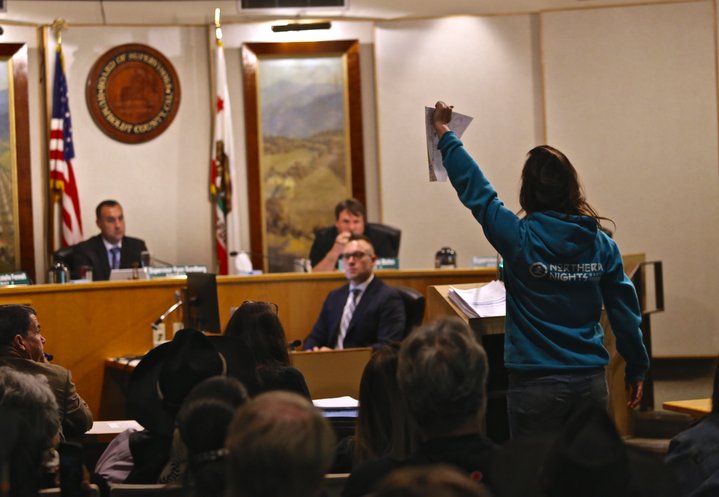
Cannabis consultant Patricia Lai waves the map of a permit application she’s working on to the board. | Photos and video: Andrew Goff
One hell of a meeting of the Humboldt County Board of Supervisors today — passionate, sometimes testy, and unpredictable.
The main event on the agenda was a request from local construction firm Mercer-Fraser to rezone a parcel they own along the Trinity River and, in the process, approve a proposed 5,000-square-foot commercial hash lab for the property.
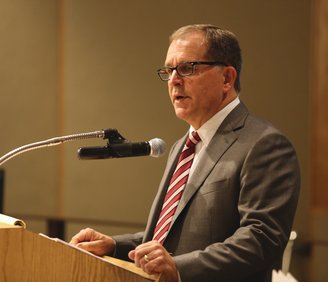
Mark Harrison, the attorney representing Mercer-Fraser.
County staff and an attorney representing Mercer-Fraser framed this proposal as little more than a minor bureaucratic maneuver, a clerical move that would make the zoning consistent with the industrial land use (gravel mining, rock crushing, pavement recycling, etc.) that’s been going on there for nearly five decades.
And the hash lab? No big deal, said the attorney, Mark Harrison: Both the state and county governments have approved commercial cannabis activity, and this extraction facility would pose no threat to the river or the community, he insisted.
But the Willow Creek and Hoopa Valley community members in attendance fundamentally disagreed. They had turned out in force, with a particularly strong showing from members of the Hoopa Valley and Yurok tribes, and their impassioned and unanimous objections transformed both the meeting and the outcome.
Over the course of nearly three hours of often fiery public testimony, this ostensibly minor bureaucratic maneuver was reframed, characterized by one public speaker after another as the latest governmental betrayal in the long local history of tribal oppression and environmental exploitation. Most of the opposition was focused on the hash lab, with numerous speakers noting its proximity to Trinity Valley Elementary School and the Trinity River.
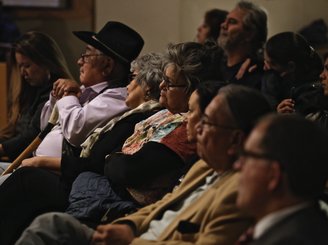
Several elected officials in the Hoopa Valley Tribe spoke in opposition to the proposed hash lab.
After the long, loooong line of speakers had had their say — with the feisty crowd frequently challenging a clearly exasperated Board Chair Ryan Sundberg as he attempted to maintain order and silence applause — there was a surprise twist in the proceedings: Mark Benzinger, a project manager with Mercer-Fraser, got up to speak on behalf of the company and said that after listening to the testimony, the company was changing its request.
“We’d like to withdraw the cannabis manufacturing portion of this permit,” Benzinger said, drawing a few gasps of surprise. That just left the rezone request, and while there was still some scattered grumbling from the crowd, the board went ahead and approved it, changing the zoning on the parcel from industrial resource-related to heavy industrial, which will allow Mercer-Fraser to continue its onsite gravel plant operations.
The parcel in question sits on the west bank of the Trinity River, just north of Willow Creek near the popular “Big Rock” swimming hole.
This outcome seemed far from certain for the bulk of the meeting. Harrison, a slick Sacramento attorney who specializes in mining and governmental relations, said in his presentation to the board that the facts were all on his clients’ side. The land use on the parcel had already been changed during the county’s General Plan Update process, completed in 2017, so the zoning change was legally required for the sake of consistency. And the cannabis facility would comply with all state and county regulations.
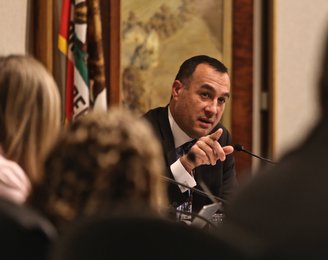
Fifth District Supervisor and Board Chair Ryan Sundberg.
While few from the public challenged Harrison on the facts, speaker after speaker made emotional pleas touching on such lofty ideals as childhood innocence, justice for indigenous tribes, and environmental stewardship.
Jon Ray, superintendent of Klamath-Trinity Joint Unified School District, said it would be simply “wrong” to have a cannabis extraction facility so close to elementary school kids.
Vivienna Orcutt, a member of the Hoopa Valley Tribe, noted that the parcel in question sits on the tribe’s ancestral territory. “When was this land taken from them?” she asked.
Larry Glass, executive director and board president of the Northcoast Environmental Center, told the board that their system is broken. People who attend meetings of the Humboldt County Planning Commission wind up “mystified” by the unnecessarily convoluted proceedings, he said.
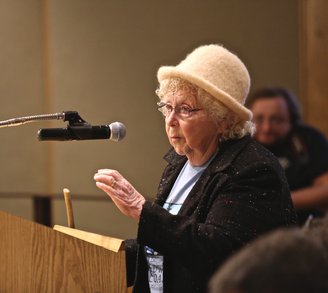
An elder from the Yurok Tribe addresses the board.
Walt Lara, Sr., a Hoopa Yurok tribal elder, emotionally recounted a litany of historical wrongs committed against his people, from timber and fish extraction in decades past to the environmental destruction of rogue “doper growers” in recent years.
Thomas Joseph, II, another Hoopa Valley Tribe member, accused the board of committing “environmental genocide.”
Mercer-Fraser President Justin Zabel was in the crowd listening to these speakers for most of the meeting. It’s not clear when he decided to pull the plug and abandon his hash lab proposal, but the move came as a relief to those who’d showed up to speak their minds.
“We are so grateful for every single person that called, emailed, prayed, and showed up at the Humboldt County Board of Supervisors mtg today to shut down the permit for an industrial hash-lab facility on the sacred Trinity River,” one Hoopa Valley Tribe member wrote on Facebook this evening. “Thank you for being good ancestors who protect our traditional territories, culture, children, and resources!”
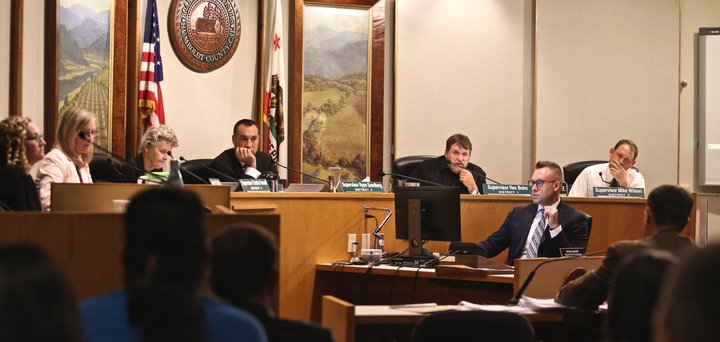
CLICK TO MANAGE